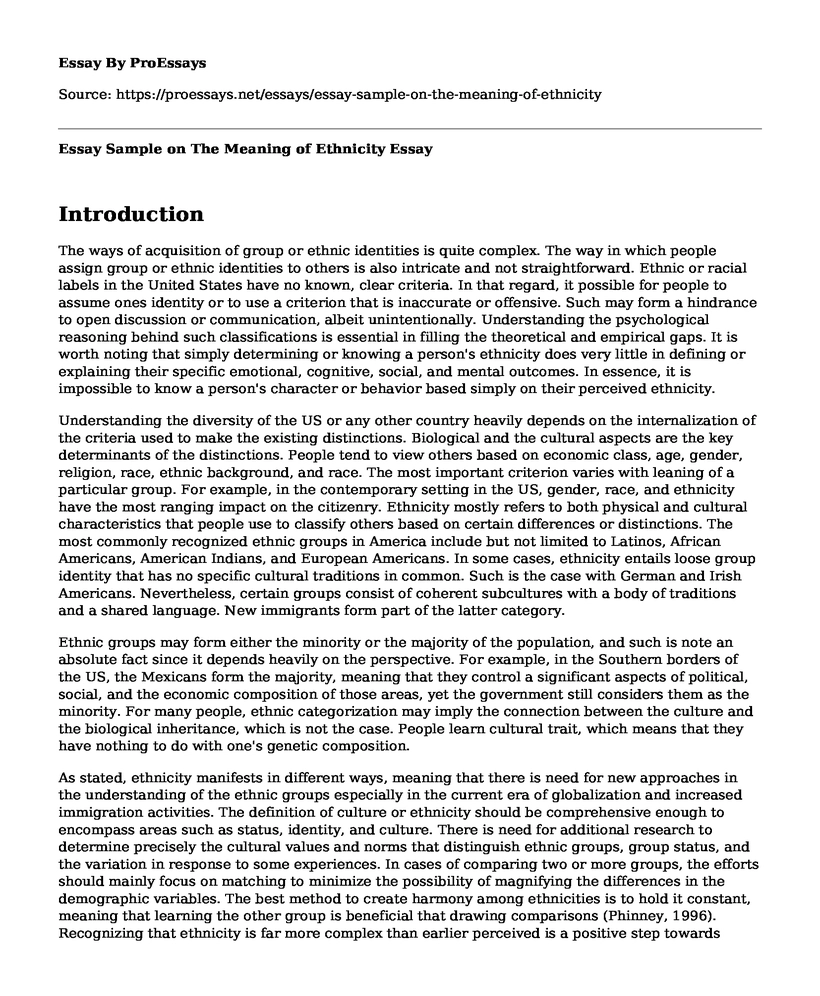Introduction
The ways of acquisition of group or ethnic identities is quite complex. The way in which people assign group or ethnic identities to others is also intricate and not straightforward. Ethnic or racial labels in the United States have no known, clear criteria. In that regard, it possible for people to assume ones identity or to use a criterion that is inaccurate or offensive. Such may form a hindrance to open discussion or communication, albeit unintentionally. Understanding the psychological reasoning behind such classifications is essential in filling the theoretical and empirical gaps. It is worth noting that simply determining or knowing a person's ethnicity does very little in defining or explaining their specific emotional, cognitive, social, and mental outcomes. In essence, it is impossible to know a person's character or behavior based simply on their perceived ethnicity.
Understanding the diversity of the US or any other country heavily depends on the internalization of the criteria used to make the existing distinctions. Biological and the cultural aspects are the key determinants of the distinctions. People tend to view others based on economic class, age, gender, religion, race, ethnic background, and race. The most important criterion varies with leaning of a particular group. For example, in the contemporary setting in the US, gender, race, and ethnicity have the most ranging impact on the citizenry. Ethnicity mostly refers to both physical and cultural characteristics that people use to classify others based on certain differences or distinctions. The most commonly recognized ethnic groups in America include but not limited to Latinos, African Americans, American Indians, and European Americans. In some cases, ethnicity entails loose group identity that has no specific cultural traditions in common. Such is the case with German and Irish Americans. Nevertheless, certain groups consist of coherent subcultures with a body of traditions and a shared language. New immigrants form part of the latter category.
Ethnic groups may form either the minority or the majority of the population, and such is note an absolute fact since it depends heavily on the perspective. For example, in the Southern borders of the US, the Mexicans form the majority, meaning that they control a significant aspects of political, social, and the economic composition of those areas, yet the government still considers them as the minority. For many people, ethnic categorization may imply the connection between the culture and the biological inheritance, which is not the case. People learn cultural trait, which means that they have nothing to do with one's genetic composition.
As stated, ethnicity manifests in different ways, meaning that there is need for new approaches in the understanding of the ethnic groups especially in the current era of globalization and increased immigration activities. The definition of culture or ethnicity should be comprehensive enough to encompass areas such as status, identity, and culture. There is need for additional research to determine precisely the cultural values and norms that distinguish ethnic groups, group status, and the variation in response to some experiences. In cases of comparing two or more groups, the efforts should mainly focus on matching to minimize the possibility of magnifying the differences in the demographic variables. The best method to create harmony among ethnicities is to hold it constant, meaning that learning the other group is beneficial that drawing comparisons (Phinney, 1996). Recognizing that ethnicity is far more complex than earlier perceived is a positive step towards understanding the cluster formation that defines ethnic groups.
References
Phinney, J. S. (1996). When we talk about American ethnic groups, what do we mean? American psychologist, 51(9), 918.
Cite this page
Essay Sample on The Meaning of Ethnicity. (2022, Dec 07). Retrieved from https://proessays.net/essays/essay-sample-on-the-meaning-of-ethnicity
If you are the original author of this essay and no longer wish to have it published on the ProEssays website, please click below to request its removal:
- The Stereotypes versus Reality of People with Tattoos: Essay Sample
- Parental Involvement and Achievement Essay
- Cultural Relativism Reactionary Essay
- Just Do It Campaign Essay Example
- Racial Segregation: Restricting Policies of US and Its Impact on African Americans - Essay Sample
- The Belt and Road Initiative: China's Global Infrastructure Push - Essay Sample
- Role of Indigenous Canadian Women in the Fur Trade - Free Essay







